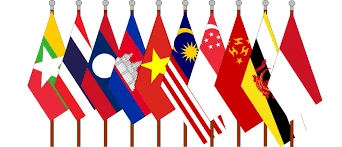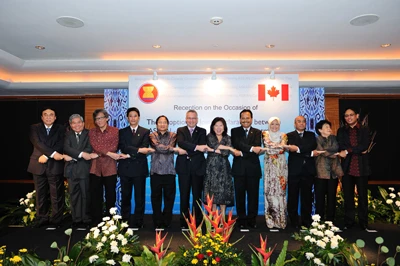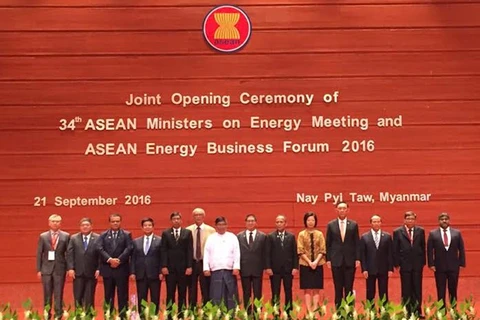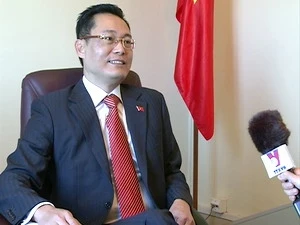 A ship at Son Duong Deep Water Port in central Ha Tinh Province. Regional logistics firms were urged to collaborate to take advantage of more trade.(Photo:VNA)
A ship at Son Duong Deep Water Port in central Ha Tinh Province. Regional logistics firms were urged to collaborate to take advantage of more trade.(Photo:VNA)HCM City (VNA) - As trade and commerce is expected to increase between Southeast Asian countries and between them and the world, there will be more opportunities for logistics services providers in the region to connect with each other to take goods to the consumers and to increase their efficiency, according to Thailand’s Department of International Trade Promotion.
Chantira Jimreivat Vivatrat, DITP’s Deputy Director General, said, “We import a lot from Vietnam and Myanmar and vice versa.”
She said she saw a lot of opportunities for Vietnamese and Thai firms in the logistics sector to enhance cooperation, adding her department would organise a logistics trade mission to Vietnam this week.
Nguyen Duy Minh, General Secretary of the Vietnam Logistics Association, said countries in the region are speeding up the ASEAN Single Window mechanism to facilitate cross-border transportation.
This is a useful strategy for countries in the region, since “we don’t have shipping companies; most shipping companies are from developed countries.
“We are close together, if we use road transportation to serve the increase in internal trade in the region, we can grab the market share of shipping lines and even air carriers.
“Nations in the region should enhance cooperation in cross-border road transportation to create business.”
According to Vivatrat, there are certain challenges preventing cooperation in the logistics sector, including regulation.
“I think every ASEAN country should work together to reduce the barriers,” she said.
Kettivit Sittisoontornwong, President of the Thai International Freight Forwarders Association, said: “People who are in international logistics know the importance of creating a network and strategic partners in every country because we need somebody in another country to handle our business, to handle our exports or imports to/from the other country.”
But many freighters in Thailand and elsewhere hesitate to cooperate with international logistics service providers, he said.
“As you see, when they come, those international logistic companies don’t have their own fleet, their own services; they may have very small operations but mostly they will find strategic partners to work with them. What we call outsourcing.”
Logistics service providers need to study and if they are not competitive in this sector they should find some other people to work together to serve their customers, he said.
Singapore topped the list of ASEAN countries in the World Bank’s 2016 Logistics Performance Index, ranking fifth globally.
Speaking at a conference held on the sidelines of the 2016 TILOG-LOGISTIX exhibition held in Bangkok from September 21 to 23, Constantine Chikosi, portfolio and operations manager of the World Bank Group, said the latest edition of LPI showed that Singapore, Malaysia and Thailand outperformed the ASEAN average.
Indonesia and Vietnam were on par with the average and ranked among the top 10 in lower middle-income countries.
However, all ASEAN countries except Singapore, Myanmar and Cambodia slid back from their rankings two years ago.
The World Bank’s LPI is based on six components: efficiency of customs and border management clearance; quality of trade and transport infrastructure; ease of arranging competitively priced shipments; competence and quality of logistics service; ability to track and trace consignments; and frequency with which shipments reach consignees within scheduled or expected delivery times.
The report, based on a survey of more than 1,200 logistics professionals, ranks 160 countries and captures critical information about the complexity of international trade.
With regard to timeliness, the frequency with which shipments reach their destination within the scheduled or expected time, ASEAN countries scored higher than the overall average, he said.
Infrastructure continues to play a big role in assuring basic connectivity and access to gateways for most developing countries. In all income groups, respondents reported that infrastructure was improving. However, in all ASEAN countries except Singapore and Malaysia, the scores for infrastructure were lower than the overall scores.
Asked what Vietnam should do to improve its logistics performance efficiency, Chikosi said: “The survey result for the 2016 LPI shows that Vietnam is one of the countries in ASEAN whose performance on infrastructure is below the average, so it clearly indicates there is an infrastructure development agenda in Vietnam. Cambodia is in a similar situation that they are putting quite a bit of money into upgrading their road infrastructure.
“Not just the hard infrastructure but also the soft infrastructure, so institutional and policy reform to support the development of services that support the logistics market would also be important in addition to physical infrastructure.-VNA























